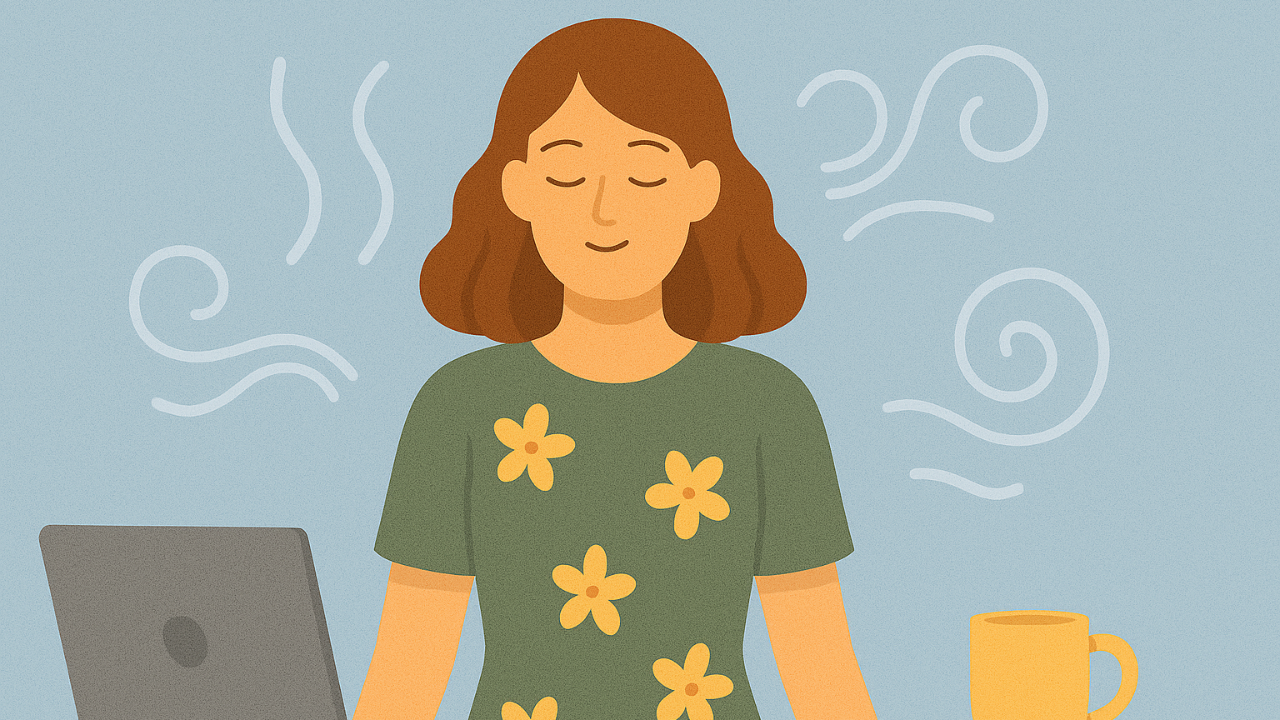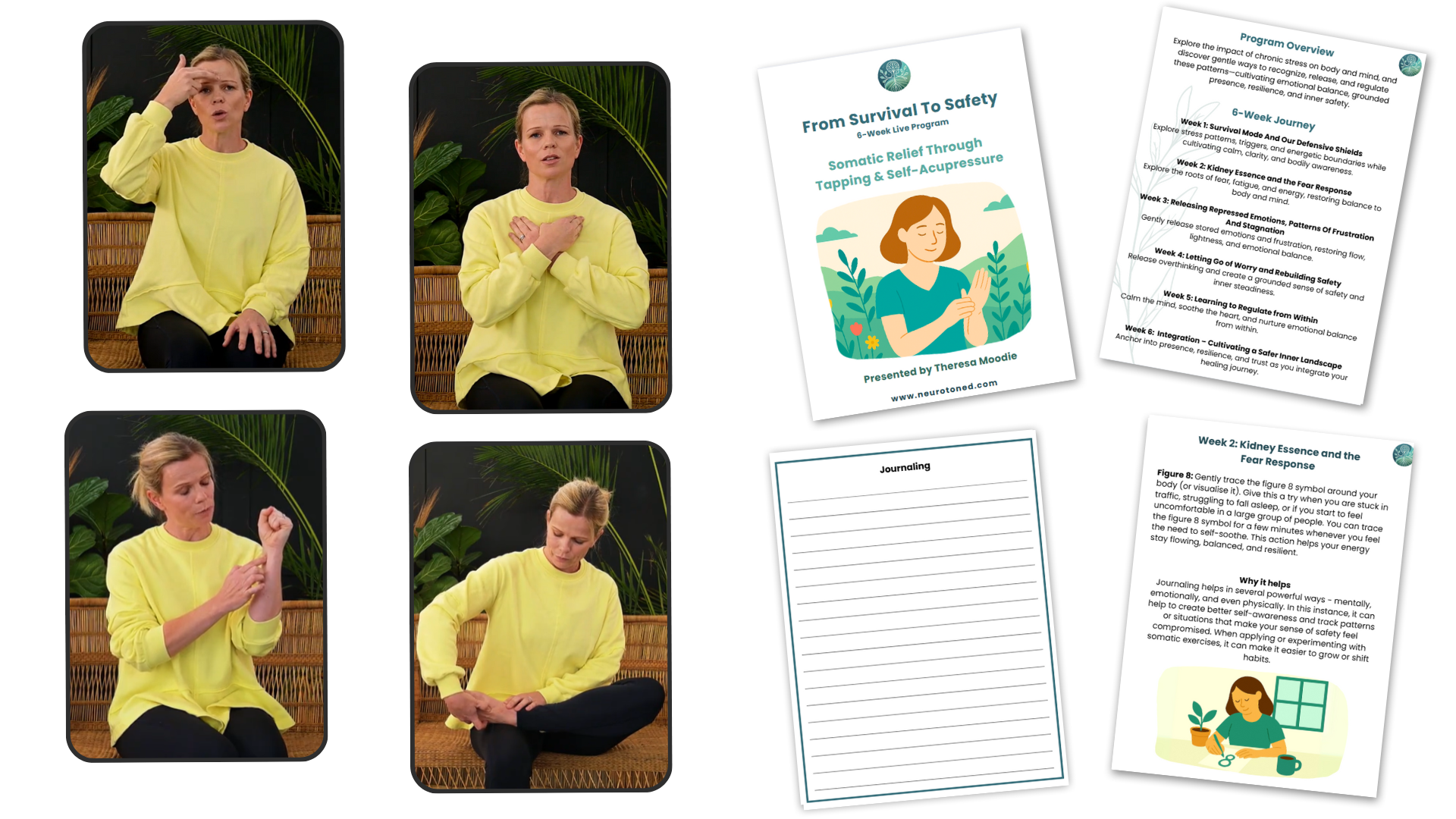
Quick Nervous System Relief for Zoom Fatigue
Feeling Wired and Drained After Every Call?
If your shoulders ache, eyes burn, and brain feels foggy after Zoom calls, you’re not imagining it. That heavy exhaustion mixed with tension is your nervous system saying, enough.
Before you go further, take a moment to check your own stress loop with the Stress Loop Quiz. It helps you see which pattern your body’s stuck in, and which reset may help most.
What Is Zoom Fatigue?
Zoom fatigue is the mental and bodily exhaustion that comes from hours of virtual meetings. It’s not just screen time. It’s the constant self-monitoring, delayed social cues, and subtle pressure to stay “on.” All of it keeps your nervous system in a low-grade state of alert.
Quick Answer Box:
Zoom fatigue happens when your nervous system stays “on” during long video calls, keeping you hyper-focused and tense. Relief comes from releasing physical tension, lowering sensory load, and grounding back into your body, often in under two minutes.
5 Nervous System Relief Tips You Can Use Between Calls
1. Blink and Look Away Every 10 Minutes
Your eyes tell your brain how safe you are. When you stare at a glowing screen too long, your vagus nerve stays tense. Every ten minutes, soften your gaze and look 20 feet away. Let your eyes wander or rest on something green or natural.
If you want a short daily reset you can copy, try a gentle, 10-minute reset you can repeat daily.
2. Drop Your Shoulders and Exhale Twice
Most people hold micro-tension in their neck and chest during calls. Try this:
- Inhale gently through your nose.
- Exhale fully through your mouth.
- Then, without forcing it, exhale once more.
That second exhale signals to your vagus nerve that it’s safe to soften. Over time, this simple release helps calm stress loops.
3. Anchor Back Into the Room
After you click “Leave Meeting,” pause before jumping to another task. Feel your feet on the floor. Notice the chair supporting you. Let your breath slow down.
Your body learns safety through sensation, not through logic. Even five seconds of awareness helps you return to baseline.
4. Change Your Posture, Change Your State
Zoom calls often freeze you in one shape–shoulders rounded, chest tight. Stand up. Roll your shoulders. Stretch your arms overhead.
If your body feels wired or anxious afterward, you can try these vagus nerve massage techniques to help your system find balance again.
5. Micro-Pause Ritual Between Meetings
Create a one-minute ritual to mark the end of each call:
- Step away from your chair.
- Shake out your hands.
- Take one slow breath in through the nose, out through the mouth.
This small act helps your body close one stress loop before the next begins.
You can find which reset fits you best by taking the Stress Loop Quiz.
7-Day Mini Plan to Recover from Zoom Fatigue
Day 1-2: Add two short body breaks daily. Even 30 seconds helps.
Day 3-4: Try the double exhale practice after every call.
Day 5: Schedule a screen-free lunch.
Day 6: Go outside for 10 minutes of natural light.
Day 7: Do one full nervous system reset before bed.
Common Sticking Points
- “I forget to take breaks.”
Set a reminder or place a sticky note on your screen that says Blink. Breathe. Move. - “I feel guilty stepping away.”
Short pauses help your focus, not harm it. Your brain processes better when your body feels safe. - “I’m too tired after work to do anything.”
Start small. One deep exhale can begin to shift your physiology toward calm.
More Gentle Reads
If this article resonated, you might also like:
- How to Reset Your Nervous System After Trauma: A Gentle, Practical Guide
- Vagus Nerve Massage Techniques for Beginners: Calm Your Body with Gentle Touch
- Building Resilience to Withstand the Storms of Stress
FAQs
1. Why do video calls make me so tired?
Because they overload your visual and emotional processing. Your body interprets constant eye contact and delayed reactions as mild stress.
2. Can nervous system exercises really help?
Yes, many people find that short, body-based resets reduce fatigue and improve focus after long calls.
3. How often should I take breaks?
Ideally every 30–45 minutes, even if it’s just a few breaths or shoulder rolls.
4. What if I can’t step away between meetings?
You can still exhale twice, unclench your jaw, or look out the window for ten seconds.
5. Is it normal to feel anxious before calls?
Yes. Screens can trigger subtle social alertness. Calming your breath before logging in can help.
Disclaimer: This article is educational and not medical advice. If you have health concerns, consider speaking with a qualified professional.
Discover Your Vagal Tone
Find out how dysregulated your nervous system is and get your personalized roadmap to feeling calm, energized, and in control


